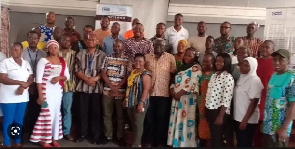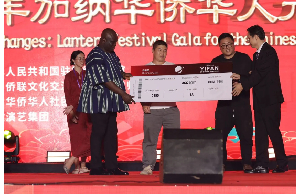Ten (10) communities under the West Mamprusi Municipality are to benefit from Plan International Ghana’s Integrated Package for Sustainable Development (IPADEV) project.
The 10 beneficiary communities are: Kpabugu, Boayini #1, Boayini #2, Sagadugu #1 and Sagadugu #2
The rest are: Zanguga, Manga, Tinkaya, Gbani and Diani.
At the end of the project, a total of 18,668 community members comprising 9,453 women/girls and 9,215 boys/men will benefit directly. This includes; 10,094 school children, 4,957 boys, and 5,137 girls.
Aside from the 18,668 people, there are about 36,000 estimated community members who will also benefit indirectly from the project.
The IPADEV project is being implemented by a Non-Governmental Organisation, Plan International Ghana in two municipalities; Jasikan Municipality in the Oti region and West Mamprusi Municipality in the North East region id been funded by the German National Office (GNO) at a cost of €1,474,759.
Addressing the gathering at the official launch and start-up meeting at Walewale, the municipal capital of the West Mamprusi Municipality, the IPADEV Project Manager, Plan International Ghana, Mr. William Domapielle, explained that the initiative seeks to contribute to creating a resilient and protective environment both at home and at school for better health and learning outcomes for children, especially girls, through equitable access to and effective utilization of WASH, Early Childhood Care and Development (ECCD), education, health facilities, and services by January 2026.
IPADEV Project Manager at Plan International Ghana announced that some key activities to be implemented under the IPADEV project are: the construction of water facilities (hand pumps, mechanized systems, Pipe extensions) in 10 communities and the construction of 10 girl-friendly institutional ultramodern toilets.
Others are the implementation of Community-Led Total Sanitation (CLTS) in all 10 project communities, to develop an SMS platform for monitoring the functionality of water Systems Support for vulnerable households to construct and own improved latrines.
“There is also a component for conducting menstrual hygiene education in targeted schools and communities as well as provision of reusable sanitary pads to school girls.” He reiterated.
Our expectations are that at the end of the IPADEV project, residents in the selected communities will have;
Improved access, and utilization of safe drinking water, sanitation, and hygiene.
For better learning outcomes in ten selected communities, improved access and usage of basic school hygiene facilities by vulnerable children, especially adolescent girls.
Improved access and utilization of basic health facilities and services at school and community levels.
And, last but not least improved access to and usage of gender-responsive Early Childhood Care and Development resources by parents and caregivers, Mr. Domapielle opined.
Again, the initiative amid at giving support to the following bodies: the Coalition of Non-Governmental Organisations in Water and Sanitation (CONIWAS) for WASH research and advocacy at the national level, the Ghana WASH Journalist Network (GWJN) to deliver WASH messages, engage the private sector for the promotion of appropriate household latrine technologies, organize hygiene promotion campaigns, support the Environmental Health and Sanitation Directorate to conduct monitoring of project communities as well as to collaborate effectively with the MSWR in the implementation of the project and other national level events.
Regional News of Monday, 6 March 2023
Source: gbcghanaonline.com
West Mamprusi Municipality to benefit from Plan Ghana’s IPADEV Project
Entertainment












